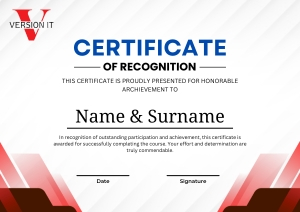Home > Courses > Popular Courses > GCP Data Engineer Course
GCP Data Engineer Training in Vijayawada
Top Google Cloud Platform Data Engineering Training in Vijayawada
Learn the basics of Data Engineering and work on the project with various Databases, Python, and SQL in real-time at Version IT.
12 Modules
with Certifications
Certificate
After Completion
English
Language
Overview of GCP Data Engineering Training
Discover you’re potential and become a big data leader at Version IT. We provide the best GCP Data Engineer Training in Vijayawada. Our program transforms you into a well qualified, certified professional who is prepared to work in the current market that is based on data. Firms are aggressively recruiting professionals capable of handling and processing cloud data and our industry-specific course is your straight ticket to high-growth and high-paying occupation.
We close the gap between the theory and the practice by providing students with the real life experience they need to create, deploy, and operate advanced data processing platforms on the Google Cloud Platform. Be a part of the team of successful data professionals under our top GCP Data Engineer Training program at the outskirts of Vijayawada.
Role of a Professional GCP Data Engineer in 2025
Any organization can hardly do without a certified GCP Data Engineer. You will be formulating the data solutions that will be used to propel business intelligence. As part of this position, you will learn all aspects of the data lifecycle on the Google Cloud Platform, ingestion and processing of enormous volumes of data, storage, analysis, and security. We prepare you to deal with complicated issues and deliver data available and trustworthy, transforming unprocessed data into effective business data.
How Version IT prepares you for GCP Data Engineer Course
- More than 80 hours of extra assignments.
- Data engineering job placements.
- Live free webinars
- Complimentary courses
- LinkedIn review and resume review.
- Endless mock interview and quizzing.
- Practicing in a live project.
- 24/7 support
- Offline hiring events
GCP Data Engineering Course Curriculum
The GCP Data Engineering courses at Version IT are well-designed to provide profound and hands-on knowledge. We provide you an opportunity to have practical experience using the core services and tools required in the position. Our program is in line with the official Google Cloud certification hence, you are well equipped to take the exam and the job.
The main aspects that you will master during our course are:
Foundations of Google Cloud An opinionated foundations course includes a comprehensive overview of the fundamentals of the Google Cloud infrastructure, such as Compute Engine, Cloud Storage, and Networking. | Designing Scalable Data Systems Get the experience in designing robust data processing systems that can support the volumes of an enterprise. |
Real-time and Batch Data Processing Become an expert in such impressive services as Dataflow to streamline the real-time process and Dataproc to process large amounts of data in the most cost-effective manner. | Data Storage Solutions Learn and deploy various GCP storage solutions Cloud SQL and Bigtable are structured storage systems, whereas Cloud storage is an unstructured storage system. |
Machine Learning Integration Explore the differences between AI Platform and BigQuery ML by learning how to build and deploy machine language (ML) models on GCP to develop smart data solutions. | Pipeline Orchestration and Monitoring Learn to monitor systems to achieve optimal performance and reliability, automate and control complicated data workflows using master tools such as Cloud Composer. |
Flexible Learning with GCP Data Engineer Online Training
We are aware of the needs of modern learners. We provide the Best GCP Data Engineer Online Training program to anyone who needs to be flexible. This course is the same rigorous curriculum taught in person with the same hands-on experience as is offered in our in-person classes. You study with the best in the industry at the comfort of your own home through interactive online courses, recorded video courses or with special assistance to ensure your learning is smooth and efficient.
Data Engineering Certification Trends in Vijayawada
Data engineering assists in the management of data and the automation of work processes. Data engineers study data to produce quality insights, which businesses can depend on to identify a new trend. The use of AI, machine learning and data science will increase significantly in the world that is becoming more and more interconnected this year. The recent trends are classified as three categories namely, data infrastructure, data architecture, and data management. Data-lineage, data-quality and data-discovery tools, which are critical aspects of metadata management, are being incorporated into the mainstream data-management platforms.
The increased adoption of data-mesh principles and significant changes to serverless architectures will be useful in unified data-management platforms. The cloud data warehouses will be necessary to be closely integrated with these systems. The ambiguity in object-storage engines, storage expenses, and special equipment will become the norm in the nearest future.
Topics You will Learn
Designing data processing systems
Designing flexible data representations. Considerations include:
- future advances in data technology
- changes to business requirements
- awareness of current state and how to migrate the design to a future state
- data modeling
- tradeoffs
- distributed systems
- schema design
Designing data pipelines. Considerations include:
- future advances in data technology
- changes to business requirements
- awareness of current state and how to migrate the design to a future state
- data modeling
- tradeoffs
- system availability
- distributed systems
- schema design
- common sources of error (eg. removing selection bias
Designing data processing infrastructure. Considerations include:
- future advances in data technology
- changes to business requirements
- awareness of current state, how to migrate the design to the future state
- data modeling
- tradeoffs
- system availability
- distributed systems
- schema design
- capacity planning
- different types of architectures: message brokers, message queues, middleware, serviceoriented
Building and maintaining data structures and databases
Building and maintaining flexible data representations
Building and maintaining pipelines. Considerations include:
- data cleansing
- batch and streaming
- transformation
- acquire and import data
- testing and quality control
- Connecting to new data sources
Building and maintaining processing infrastructure. Considerations include:
- provisioning resources
- monitoring pipelines
- adjusting pipelines
- testing and quality control
Analyzing data and enabling machine learning
Analyzing data. Considerations include:
- data collection and labeling
- data visualization
- dimensionality reduction
- data cleaning/normalization
- defining success metrics
Machine learning. Considerations include:
- feature selection/engineering
- algorithm selection
- debugging a model
Machine learning model deployment. Considerations include:
- performance/cost optimization
- online/dynamic learning
Ensuring reliability
Performing quality control. Considerations include:
- verification
- building and running test suites
- pipeline monitoring
Assessing, troubleshooting, and improving data representations and data processing
infrastructure.
Recovering data. Considerations include:
- planning (e.g. fault-tolerance)
- executing (e.g., rerunning failed jobs, performing retrospective re-analysis)
- stress testing data recovery plans and processes
Data Structures or Collections
- Applications of Data structures
- Types of Collections
- Sequence
- Strings, List, Tuple, range
- Non sequence
- Set, Frozen set, Dictionary
- Strings
- What is string
- Representation of Strings
- Processing elements using indexing
- Processing elements using Iterators
- Manipulation of String using Indexing and Slicing
- String operators
- Methods of String object
- String Formatting
- String functions
- String Immutability
- Case studies
Tuple Collection
- What is tuple?
- Different ways of creating Tuple
- Method of Tuple object
- Tuple is Immutable
- Mutable and Immutable elements of Tuple
- Process tuple through Indexing and Slicing
- List v/s Tuple
Visualizing data and advocating policy
- Building (or selecting) data visualization and reporting tools. Considerations include:
automation - decision support
- data summarization, (e.g, translation up the chain, fidelity, trackability, integrity)
Advocating policies and publishing data and reports.
Designing for security and compliance
Designing secure data infrastructure and processes. Considerations include:
- Identity and Access Management (IAM)
- data security
- penetration testing
- Separation of Duties (SoD)
- security control
- Designing for legal compliance. Considerations include:
legislation (e.g., Health Insurance Portability and Accountability Act (HIPAA), Children’s
Online Privacy Protection Act (COPPA), etc.) - audits
Operators
- Arithmetic Operators
- Comparison Operators
- Python Assignment Operators
- Logical Operators
- Bitwise Operators
- Shift operators
- Membership Operators
- Identity Operators
- Ternary Operator
- Operator precedence
- Difference between “is” vs “==”
Control Statements
- Conditional control statements
- If
- If-else
- If-elif-else
- Nested-if
- Loop control statements
- for
- while
- Nested loops
- Branching statements
- Break
- Continue
- Pass
- Return
- Case studies
List Collection
- What is List
- Need of List collection
- Different ways of creating List
- List comprehension
- List indices
- Processing elements of List through Indexing and Slicing
- List object methods
- List is Mutable
- Mutable and Immutable elements of List
- Nested Lists
- List_of_lists
- Hardcopy, shallowCopy and DeepCopy
- zip() in Python
- How to unzip?
- Python Arrays:
- Case studies
Set Collection
- What is set?
- Different ways of creating set
- Difference between list and set
- Iteration Over Sets
- Accessing elements of set
- Python Set Methods
- Python Set Operations
- Union of sets
- functions and methods of set
- Python Frozen set
- Difference between set and frozenset ?
- Case study
Let Your Certificates Speak

- Comprehensive training in GCP Data Engineer.
- Certificates are globally recognized & they upgrade your programming profile.
- Certificates are generated after the completion of course.
All You Need to Start this Course
- Basic understanding of data concepts, SQL, and programming languages like Python.
- Familiarity with cloud computing concepts and prior experience with any cloud platform would be beneficial but not mandatory.
Testimonials




Still Having Doubts?
The course is targeting IT professionals, software developers, data analysts, and all those who want to pursue a career in cloud-based data engineering. Even a simple familiarity with the data concepts and SQL is not obligatory but beneficial.
No rigid requirements are present. Adequate experience in a programming language such as Python and knowledge of the basic data concepts will be of benefit.
Absolutely. Our education is based on real-life experience. You will be doing a few mini-projects and a significant capstone project in order to put your learning to practice.
We do provide them with free placement service to all students. This involves resume development, interview training and contacts with our recruiting partners.
The time will be different, according to the batch, weekday, weekend. Contact our admissions team and get up-to-date information on schedules.


